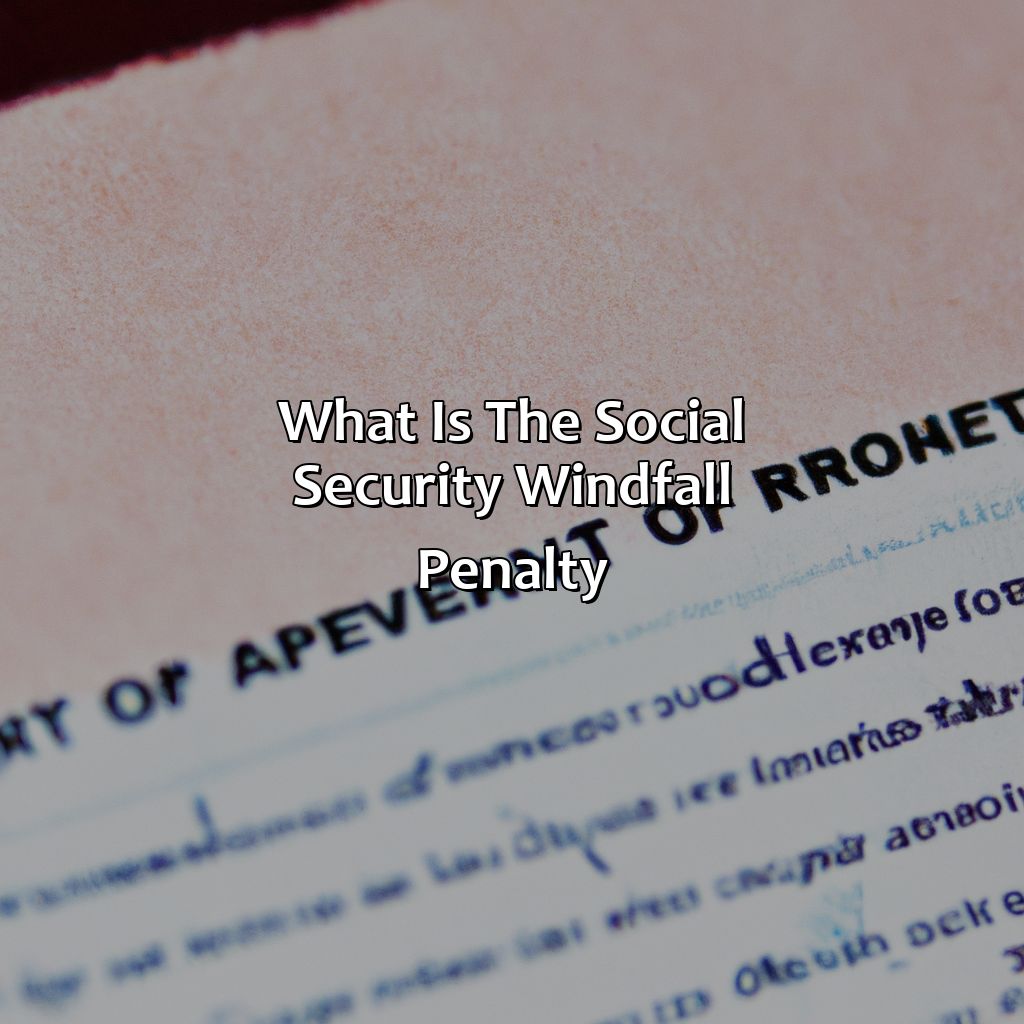What Is The Social Security Windfall Penalty?
Key Takeaway:
- Social Security Windfall Penalty can affect those who have both a work pension and Social Security benefits. The penalty reduces the amount of Social Security benefits received due to the work pension.
- A Social Security Windfall is a government pension not subject to Social Security taxes. This can affect the calculation of Social Security benefits and result in a reduction of payments received.
- Calculating Social Security benefits involves the use of a formula that takes into account factors such as the individual’s work history and lifetime earnings. The formula is then used to determine the monthly payment amount.
Are you worried about incurring penalties when taking Social Security? Learn how the Social Security Windfall Elimination Provision works and how to avoid it. You need to understand the rules to get your benefits without penalty.
Understanding Social Security Windfall Penalty
Social Security Windfall Penalty is a reduction in your Social Security benefits due to certain governmental pensions. This occurs when individuals who have worked in jobs where Social Security taxes were not withheld, such as government employees, later become eligible for Social Security benefits. The penalty is designed to prevent “double-dipping” and to ensure fairness among recipients. If you receive a pension from a job not covered by Social Security, you may be subject to this penalty. It is important to understand the rules surrounding this penalty to avoid any surprises when it comes to retirement income.
Additionally, if you are eligible for a pension based on earnings not covered by Social Security and your spouse also receives a government pension, both of your Social Security benefits may be reduced. However, there are exceptions to this rule, such as if you were first eligible for one of these pensions before 1985 or if you have enough years of substantial earnings in a job covered by Social Security.
To avoid missing out on important retirement income, it’s essential to understand how the Social Security Windfall Penalty works and how it could affect your benefits. If you’re unsure about your eligibility or have questions about the penalty, consult with a financial advisor or Social Security representative.
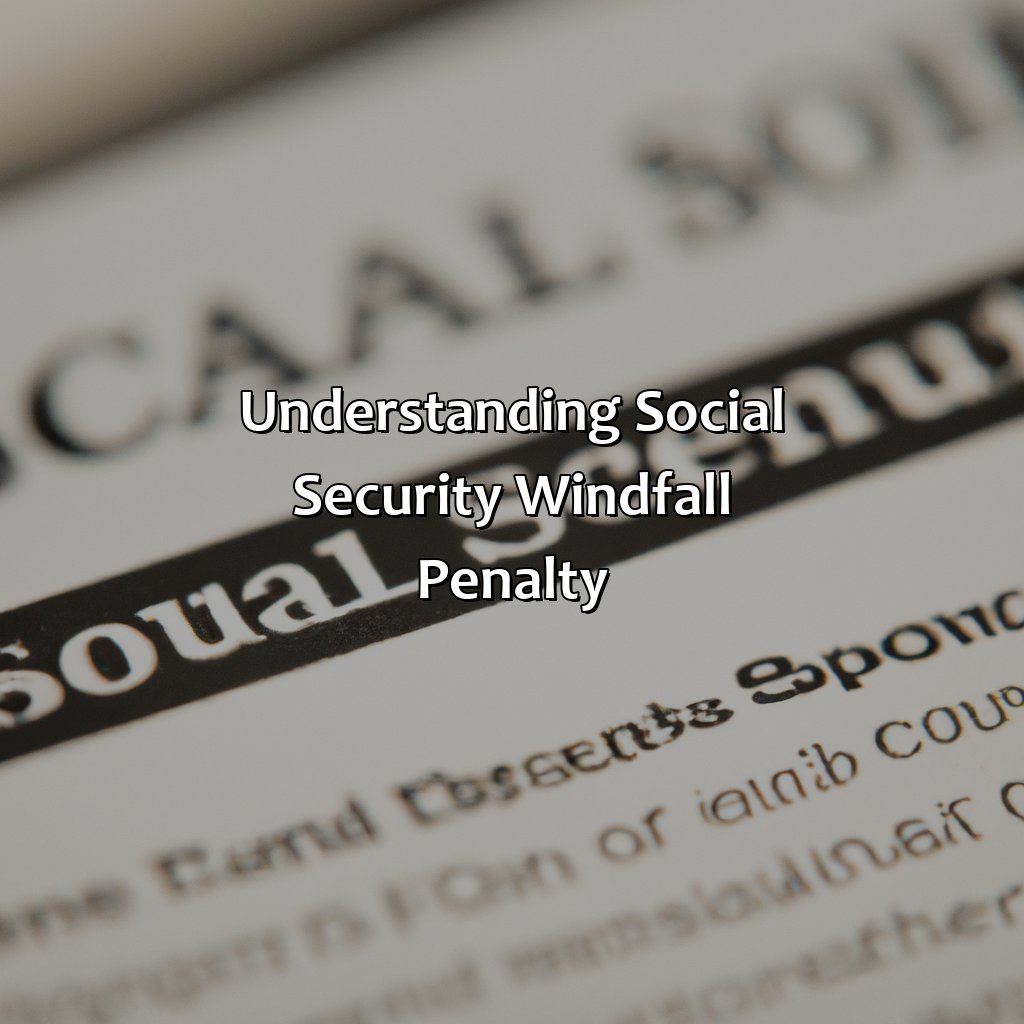
Image credits: retiregenz.com by Yuval Jones
What is Social Security Windfall?
Social Security Windfall refers to a provision in the Social Security Act, where some workers who earn a pension through their non-Social Security employment may be subjected to a reduction in their Social Security spousal or survivor benefits. The Windfall Elimination Provision (WEP) modifies how your Social Security retirement or disability benefits are calculated if you worked for an employer who did not withhold Social Security taxes. Instead of using the regular calculation formula, the WEP formula provides a lower benefit amount.
If a worker is eligible for both a Social Security benefit and a pension from a job where Social Security taxes were not paid, the Windfall Elimination Provision (WEP) may apply. WEP reduces the worker’s Social Security benefit by a formula that is based on their earnings history. The WEP can reduce a worker’s Social Security benefit by as much as half of their pension amount.
It’s essential to plan for the Windfall Elimination Provision (WEP) and consider how any additional pension income may affect your Social Security benefit. To reduce the impact of the WEP, you can increase your substantial earnings by working in a job where Social Security taxes are withheld for a more extended period. Alternatively, you may also explore investment options that generate taxable income to supplement your retirement income sources while keeping your pension income below the WEP threshold.
Overall, it is crucial to be mindful of the Social Security Windfall penalty and plan accordingly as you approach retirement. Understanding the mechanics of the Windfall Elimination Provision (WEP) can help you avoid potential surprises and optimize your retirement income.

Image credits: retiregenz.com by Adam Arnold
Calculation of Social Security Benefits
Social Security Benefits Calculation:
The calculation of Social Security benefits involves various factors that determine the amount of money a retiree is eligible to receive. These factors include the retiree’s earnings, age at retirement, and number of years worked.
Table for Social Security Benefits Calculation:
| Column 1: Factor | Column 2: Definition | Column 3: Example |
|---|---|---|
| Earnings | The amount of income a retiree has earned throughout their working life. | $50,000 per year |
| Age at retirement | The age at which a retiree starts receiving Social Security benefits. | 65 years old |
| Number of years worked | The number of years a retiree has worked and paid into Social Security. | 30 years |
Unique Details for Social Security Benefits Calculation:
In addition to the factors listed in the table, Social Security benefits calculation also considers the inflation rate and the retiree’s marital status. The inflation rate determines the cost-of-living adjustment (COLA) that affects the retiree’s benefit amount. Married individuals may also be eligible for spousal benefits.
Pro Tip for Social Security Benefits Calculation:
It is important to plan ahead and understand how Social Security benefits are calculated to maximize your retirement income. Consider working with a financial advisor or consulting the Social Security Administration’s online resources to ensure you receive the most from your benefits.

Image credits: retiregenz.com by David Woodhock
Social Security Windfall Penalty Rules
Social Security benefits can be reduced by a penalty known as the Windfall Elimination Provision. This rule affects those who receive Social Security benefits but also have a government pension based on work not covered by Social Security. The formula for calculating the reduction in benefits is complex and can vary depending on individual circumstances. It is important for those impacted by this penalty to review their Social Security statements and plan accordingly.
An example of this can be seen in the case of a retired teacher who saw a significant reduction in her Social Security benefits due to her government pension.
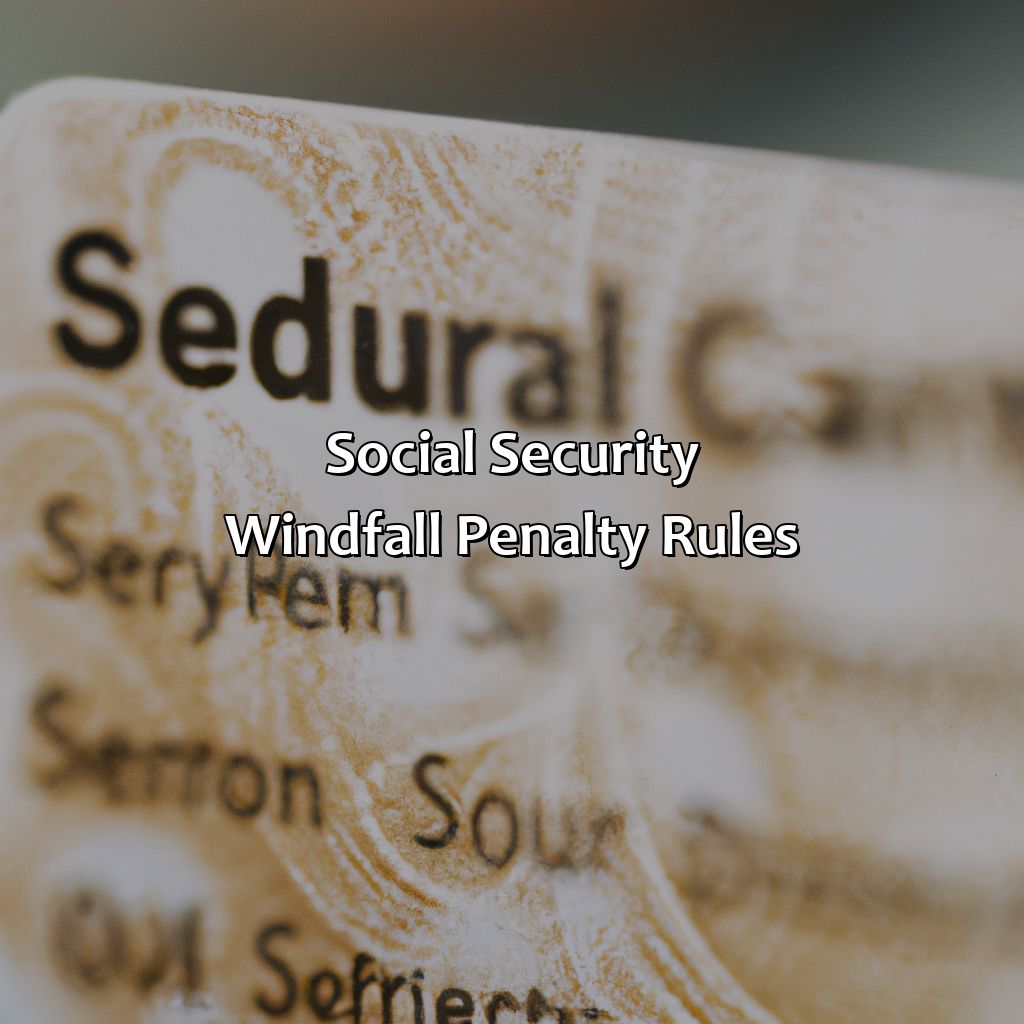
Image credits: retiregenz.com by Joel Arnold
Exceptions to Social Security Windfall Penalty
Exceptions to the Social Security Windfall Penalty
Certain exceptions apply to the Social Security Windfall Penalty. Pension payments from non-Social Security-covered employment are commonly exempt. Spouses who get benefits and have worked in Social Security-covered employment could be exempt. In addition, individuals who reach the age of 62 after December 31, 1983, may be eligible for a modified formula that reduces the SS WEP by lesser percentages.
Furthermore, if an individual is subject to the Windfall Elimination Provision and both of the following assertions are true, they may use the existing formula to calculate their SS benefits. They must have:
- Social Security benefits after December 1982 and
- paid into other retirement benefits for at least 30 years.
It is vital to note that all exceptions to the Windfall Elimination Provision may not apply to a specific individual’s circumstances.
President Reagan signed the Windfall Elimination Provision in 1983. His administration felt that some people were receiving excessive benefits due to accurate compensation in non-Social Security-covered jobs. As a result, they altered the formula to appropriately recognize non-Social Security-covered income while calculating Social Security benefits.
Overall, understanding exceptions to the Social Security Windfall Penalty can be complicated and difficult. It is recommended that individuals seek professional advice to ensure they are making informed decisions.
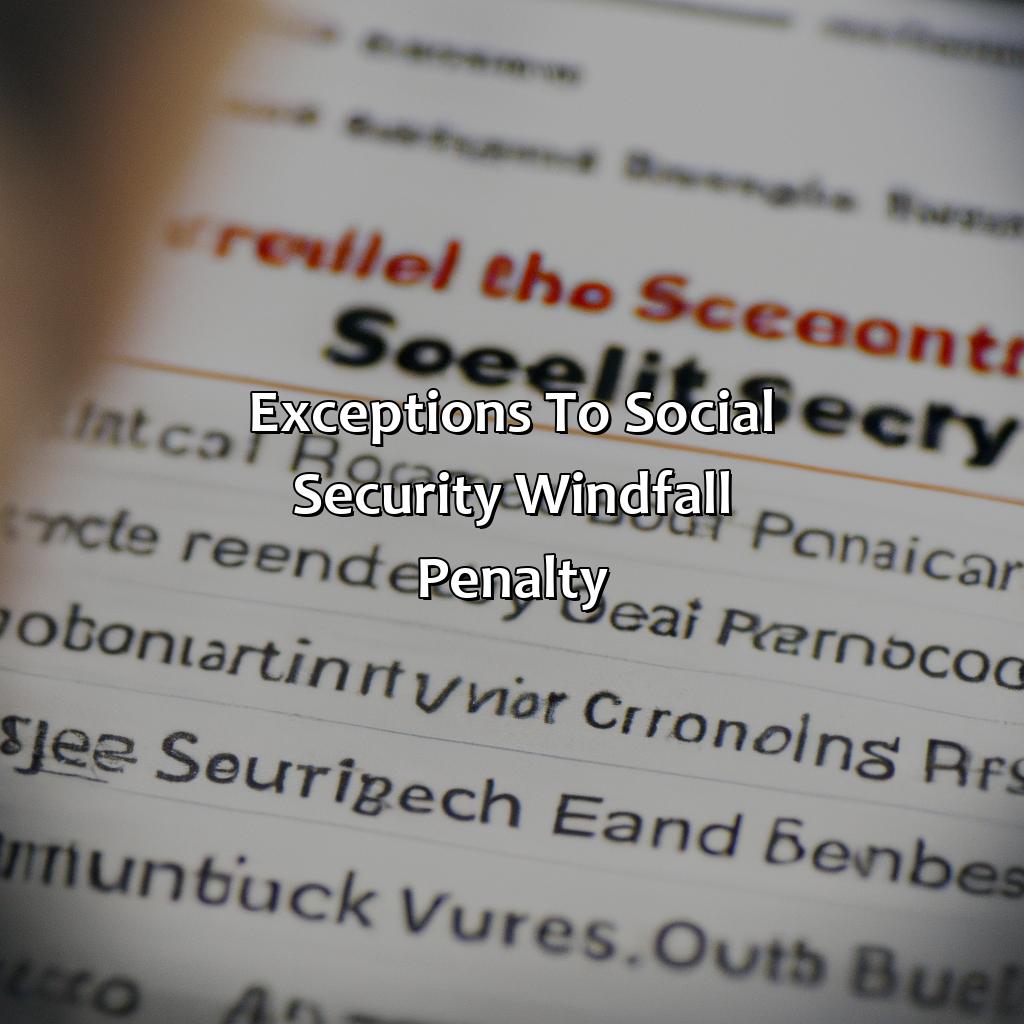
Image credits: retiregenz.com by Harry Jones
How to Avoid or Minimize Social Security Windfall Penalty
Social Security Windfall Penalty can be avoided or minimized. Here’s a 4-step guide to help you achieve this:
- Determine your eligibility for Windfall Elimination Provision or Government Pension Offset.
- Know the difference between Pension and Retirement Benefits.
- Delay taking your Social Security benefits as long as possible.
- Make sure that your earnings record is accurate and up to date.
It is crucial to note that there are unique details that have not been covered in this guide, such as the effects of a survivor’s benefits. The key is to consult with a professional who can provide unique details ultimately.
Fun Fact: A report from Social Security Matters shows that the majority of retirees rely on Social Security as their primary source of income.
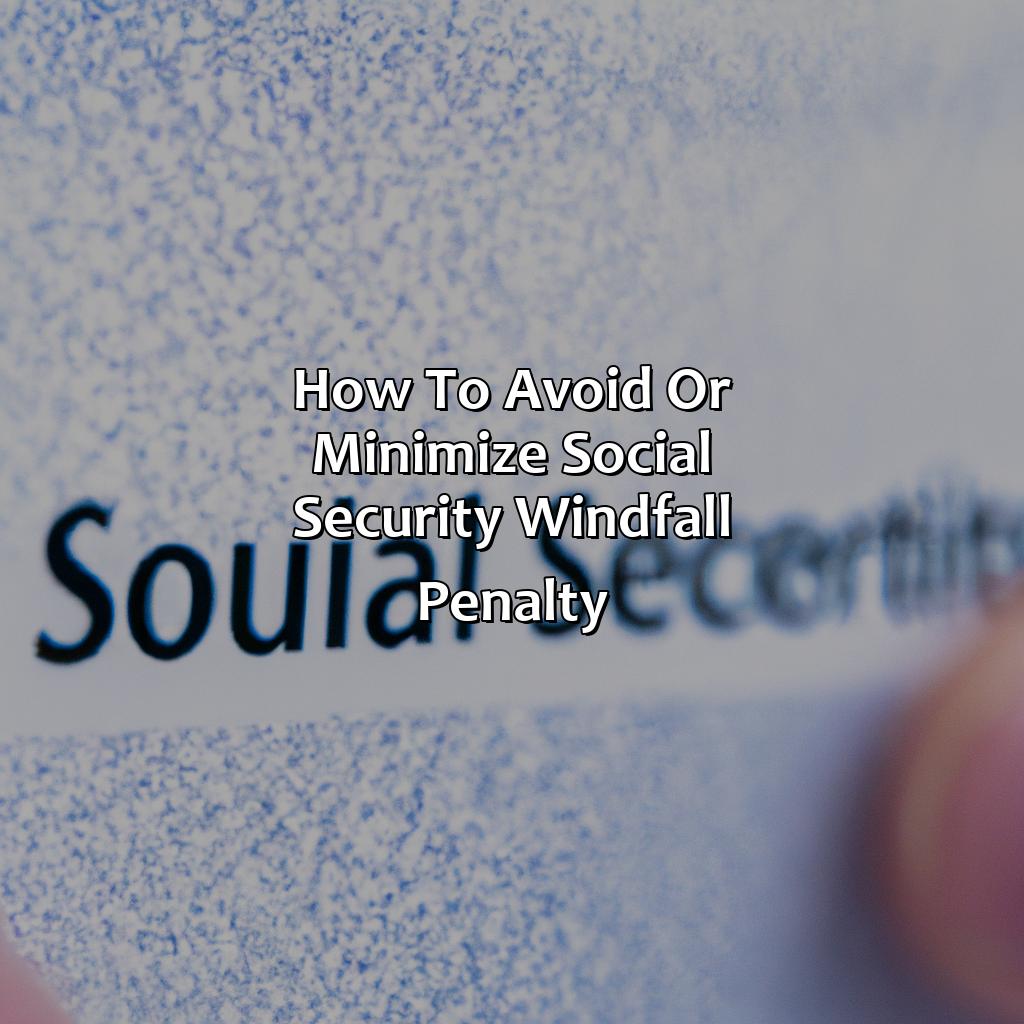
Image credits: retiregenz.com by Joel Duncun
Some Facts About Social Security Windfall Penalty:
- ✅ The Social Security windfall penalty affects individuals who receive a pension from a government job that is not covered by Social Security. (Source: TheBalance)
- ✅ The penalty reduces the Social Security benefit amount by up to two-thirds of the pension amount. (Source: Investopedia)
- ✅ The windfall penalty does not apply if the government job was covered by both Social Security and the pension plan. (Source: Social Security Administration)
- ✅ There are certain exemptions and exceptions that may apply to the windfall penalty, such as the existence of a certain type of coverage gap. (Source: AARP)
- ✅ The windfall penalty only affects a small percentage of Social Security beneficiaries, but those who are affected may see a significant decrease in their benefits. (Source: Kiplinger)
FAQs about What Is The Social Security Windfall Penalty?
What is the Social Security Windfall Penalty?
The Social Security Windfall Penalty is a provision of the Social Security Act that affects individuals who receive a pension from a job not covered by Social Security, in addition to Social Security retirement or disability benefits.
How does the Windfall Penalty work?
The Windfall Penalty reduces the Social Security benefit amount that a person is eligible to receive when they have also earned a pension from a job not covered by Social Security. The reduction is based on a formula that applies to individuals who have fewer than 30 years of substantial contributions to Social Security.
What is considered a job not covered by Social Security?
Jobs that are not covered by Social Security include those in which the employer does not withhold Social Security taxes, such as some government positions, state and local government agencies, and certain non-profits. Private sector jobs covered by a pension plan are also considered not covered by Social Security for the purposes of the Windfall Penalty.
Is the Windfall Penalty always applied?
No, the Windfall Penalty is not applied in all cases. It only applies in situations where an individual has earned both a pension from a job not covered by Social Security and is eligible for Social Security retirement or disability benefits.
Can someone avoid the Windfall Penalty?
There is no way to avoid the Windfall Penalty if you are eligible for Social Security benefits and receive a pension from a job not covered by Social Security. However, individuals who have 30 or more years of substantial earnings covered by Social Security are not subject to the Windfall Penalty.
How can I find out if I am affected by the Windfall Penalty?
You can contact the Social Security Administration to find out if you are affected by the Windfall Penalty. You can also use the Windfall Elimination Provision (WEP) Calculator on the Social Security website to calculate your potential Social Security benefit reduction.
